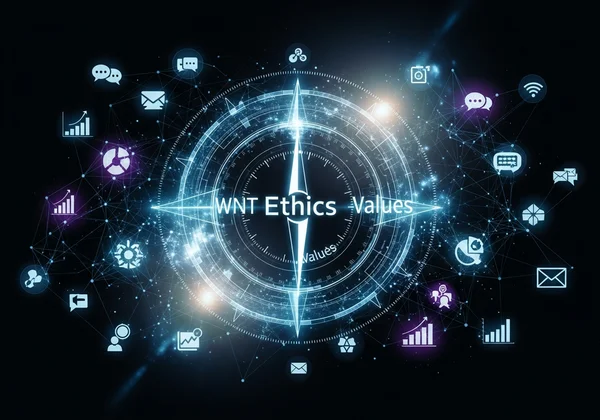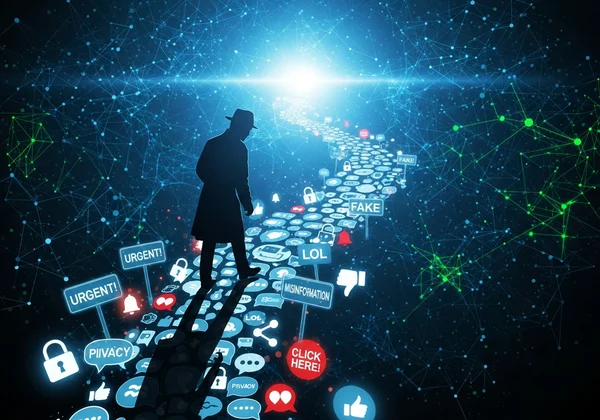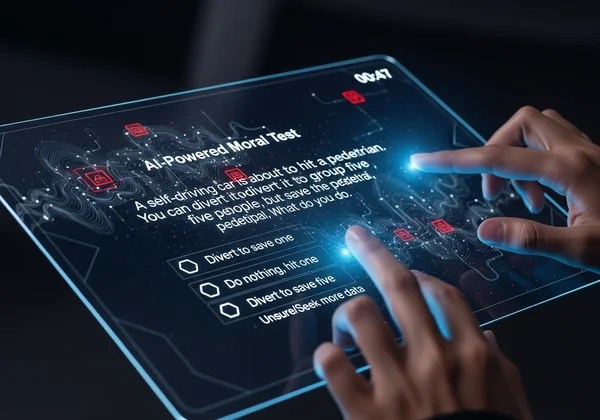Online Moral Test: Navigating Digital Ethics and Your Values
November 20, 2025 | By Julian Croft
The digital world is no longer just a space we visit; it’s where we live, work, and connect. It’s an extension of our society, complete with its own unique set of ethical challenges. From a simple comment on social media to the complex algorithms that shape our newsfeeds, our moral compass is tested daily. As a psychology enthusiast fascinated by human behavior, I see this digital frontier as a profound area for self-reflection. How do I figure out my morals and values when the rules are constantly changing? This article will guide you through 7 of the most common online moral dilemmas we face today. Understanding these challenges is the first step to becoming a more conscious and responsible digital citizen. Taking a detailed moral test is a practical way to begin this journey. To truly navigate this landscape, you must first understand your ethical core.
Understanding Digital Ethics: Why It Matters Now More Than Ever
Digital ethics isn't just an abstract concept for philosophers or tech developers; it's a practical framework for everyday life. It involves applying our principles of right and wrong to our actions in the online world. The speed and scale of digital communication mean that a single decision can have a ripple effect far greater than in the physical world. What might seem like a harmless share or a private message can quickly become a public issue. That’s why taking the time to consider the ethical dimensions of our online behavior is not just important—it’s essential for a healthy digital society.

The Evolving Landscape of Online Interactions
The platforms we use are in constant flux. New features, apps, and forms of communication emerge, bringing with them new ethical gray areas. What was acceptable yesterday might be questionable today. This rapid evolution means we can't rely on old rules. Instead, we must develop a flexible and resilient ethical framework that allows us to adapt and make sound judgments in unfamiliar situations. This requires a deep sense of self-awareness about what we truly value.
Your Role as a Responsible Digital Citizen
Every click, comment, and share contributes to the overall culture of the internet. You are not just a passive consumer of content; you are an active participant shaping the digital environment. Embracing your role as a responsible digital citizen means recognizing the power you hold. It’s about choosing to engage with empathy, to share with integrity, and to contribute positively to online communities. This journey of responsibility begins with understanding your own decision-making process. Taking an online moral test can reveal the principles you rely on, which is something you can do when you explore your moral values.
Common Online Moral Dilemmas: The 7 Challenges
Navigating the online world often feels like walking through a minefield of complex choices. Here are seven common online moral dilemmas that test our ethical boundaries every day. By examining them, we can better prepare ourselves to act with intention and integrity.

Privacy vs. Connectivity: Sharing Too Much?
We share our lives online to connect with others, but where is the line between connection and overexposure? The dilemma of online privacy is central to modern life. Every photo, status update, and check-in adds to a digital footprint that can be difficult to erase. The ethical challenge lies in balancing our desire for community with our fundamental right to privacy. It forces us to ask: What information is safe to share, and who should have access to it?
Misinformation & Disinformation: Fact vs. Fiction Online
The spread of fake news and false narratives is one of the most significant ethical challenges of our time. It’s incredibly easy to share an article without verifying its source, contributing to a cycle of confusion and mistrust. The moral responsibility falls on each of us to be critical consumers of information. We must prioritize accuracy over outrage and commit to sharing only what we know to be true, thereby building a more reliable and trustworthy online ecosystem.
Cancel Culture & Online Shaming: Justice or Mob Mentality?
Online platforms have given a voice to many, allowing for powerful movements of social justice and accountability. However, this power can also manifest as online shaming or "cancel culture," where public condemnation can escalate rapidly and without due process. The ethical tightrope here is balancing the need for accountability with the principles of compassion and forgiveness. It challenges us to consider whether our pursuit of justice is constructive or simply punitive.
Algorithmic Bias & AI Ethics: Unseen Influences
The algorithms that curate our feeds and recommend content are not neutral. They are built by humans and can reflect societal biases, creating systems that are unfair. The field of AI ethics grapples with these unseen influences, which can impact everything from loan applications to news exposure. As users, our ethical role is to be aware of these biases and advocate for technology that promotes fairness and digital equity. Understanding these systems starts with understanding how decisions are made. A sophisticated moral test, for example, can show you how different ethical frameworks lead to different outcomes—a process you can explore with an AI-powered test.

Echo Chambers & Polarization: Dialogue or Division?
It's natural to seek out online communities that share our views. However, algorithms often reinforce this tendency, trapping us in "echo chambers" where dissenting opinions are filtered out. This can lead to increased social polarization and an inability to understand different perspectives. The ethical task is to actively break out of these bubbles by seeking diverse sources of information and engaging in respectful dialogue with those who hold different beliefs.
Digital Empathy & Trolling: The Human Cost
Anonymity can embolden people to behave in ways they never would face-to-face, leading to trolling, harassment, and cyberbullying. The screen can create a psychological distance, making it easier to forget that there is a real person with real feelings on the other side. Cultivating digital empathy means consciously choosing kindness and compassion in our interactions. It’s about remembering the human cost of our words and actions.
Content Ownership & Piracy: Respecting Intellectual Property
In a world where content can be copied and shared with a single click, respecting digital rights has become a significant ethical issue. Illegally downloading movies, music, or software, or using images without permission, devalues the work of creators. The moral imperative is to acknowledge and respect intellectual property by seeking out legitimate sources and giving credit where it is due, supporting a creative ecosystem where artists and innovators can thrive.
Cultivating Your Social Media Ethics
Recognizing these dilemmas is the first step. The next is to actively cultivate a stronger ethical presence online. This isn't about achieving perfection but about making a conscious and consistent effort to align your digital actions with your core values. Your social media presence can be a reflection of your best self.
Practical Strategies for Ethical Online Conduct
Developing ethical online habits is a practice. Start with small, actionable steps. Pause before you post and ask yourself: Is this true? Is it kind? Is it necessary? Verify information from multiple sources before you share it. When you disagree with someone, focus on the argument, not the person. And finally, be mindful of your digital footprint and regularly review your privacy settings.
Developing Your Personal Digital Code
Ultimately, navigating the digital world effectively requires an internal compass. Consider creating a personal digital code of conduct based on your core values, such as honesty, empathy, and respect. This code can serve as your guide for difficult decisions. Knowing what you stand for is your greatest asset in the digital age. If you're ready to define your principles, you can start your free moral test today.
Building Your Digital Moral Compass: Next Steps
The digital world is a powerful reflection of our collective humanity—its flaws and its potential. By thoughtfully engaging with these modern ethical challenges, we can each contribute to a more responsible, empathetic, and constructive online environment. The journey toward becoming a better digital citizen begins with self-awareness. Taking a free moral test is a powerful tool for building this understanding. Knowing your own moral framework is the foundational step toward making conscious, ethical choices online.

Ready to Test Your Internet Morality?
Your online actions are driven by your underlying values. To navigate the complexities of digital life with confidence, it helps to know where you stand. Are you ready to discover your moral compass and gain deep insights into your ethical decision-making process?
FAQ Section
How do I figure out my morals and values in the digital age?
Figuring out your morals in the digital age involves self-reflection. Pay attention to your emotional reactions to online events. Ask yourself why certain issues bother you more than others. Engaging with tools designed for ethical exploration, like a comprehensive moral test or an ethical compass test, can provide structured insights into your core values and how they apply to modern dilemmas.
What are the most common ethical challenges I might face online?
The most common challenges include balancing privacy with social sharing, identifying and avoiding the spread of misinformation, navigating online conflicts like cancel culture, and recognizing the influence of algorithmic bias. Others include dealing with cyberbullying and respecting intellectual property rights in a share-heavy culture.
How can I tell if my online actions are truly moral?
A good test is to apply real-world principles. Would you say or do this in person? Consider the potential impact on others. Does your action contribute positively or negatively to the conversation or community? Aligning your online behavior with values like honesty, empathy, and fairness is a strong indicator of moral conduct.
Is empathy a core value for effective digital citizenship?
Absolutely. Empathy is arguably the most crucial value for a healthy digital society. It is the ability to understand and share the feelings of another person, which helps prevent trolling, harassment, and the spread of hurtful content. Practicing empathy online—remembering the human behind the screen—is fundamental to effective and responsible digital citizenship.
What is the purpose of an internet morality test?
The purpose of an online morality test is to provide a mirror for your ethical decision-making processes. It presents you with challenging scenarios to reveal your underlying moral foundations and values. It is not about judging you as "good" or "bad" but about increasing your self-awareness so you can navigate complex ethical situations with greater confidence and clarity.